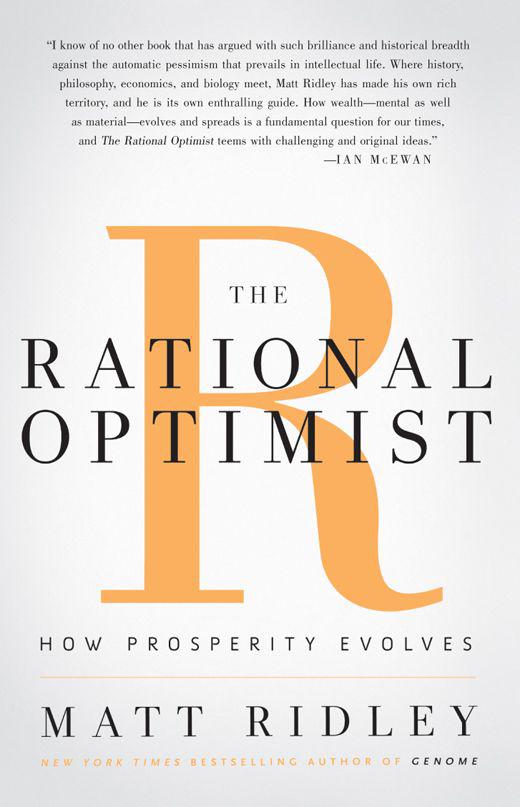Highlights from The Rational Optimist by Matt Ridley

Highlights from this book
-
Without trade, innovation just does not happen. Exchange is to technology as sex is to evolution. It stimulates novelty.
-
The history of human prosperity, as Robert Wright has argued, lies in the repeated discovery of non-zero-sum bargains that benefit both sides.
-
For most people, therefore, the market does not feel like a virtuous place. It feels like an arena in which the consumer does battle with the producer to see who can win.
-
Like biological evolution, the market is a bottom-up world with nobody in charge.
-
True enough, but I see these rules and institutions as evolutionary phenomena, too, emerging bottom-up in society rather than being imposed top-down by fortuitously Solomonic rulers. They come through the filter of cultural selection just as surely as do technologies. And if you look at the history of, for instance, merchant law, you find exactly this: merchants make it up as they go along, turning their innovations into customs, ostracising those who break the informal rules and only later do monarchs subsume the rules within the laws of the land.
-
Human history is driven by a co-evolution of rules and tools. The increasing specialisation of the human species, and the enlarging habit of exchange, are the root cause of innovation in both.
-
I am not saying fossil fuels are irreplaceable. I can easily envisage a world in 2050 in which fossil fuels have declined in importance relative to other forms of energy. I can envisage plug-in hybrid cars that use cheap off-peak (nuclear) electricity for their first twenty miles; I can imagine vast solar-power farms exporting electricity from sunny deserts in Algeria or Arizona; I can imagine hot-dry-rock geothermal plants; above all, I foresee pebble-bed, passive-safe, modular nuclear reactors everywhere. I can even imagine wind, tide, wave and biomass energy making small contributions, though these should be a last resort because they are so expensive and environmentally destructive. But this I know: we will need the watts from somewhere. They are our slaves. Thomas Edison deserves the last word: ‘I am ashamed at the number of things around my house and shops that are done by animals – human beings, I mean – and ought to be done by a motor without any sense of fatigue or pain. Hereafter a motor must do all the chores.’
-
The world of things – of pecans or power stations – is indeed often subject to diminishing returns. But the world of ideas is not.
-
The possibility of new knowledge makes the steady state impossible. Somewhere somebody will have a new idea and that idea will enable him to invent a new combination of atoms both to create and to exploit imperfections in the market.
-
To explain the modern global economy, then, you have to explain where this perpetual innovation machine came from. What kick-started the increasing returns? They were not planned, directed or ordered: they emerged, evolved, bottom-up, from specialisation and exchange. The accelerated exchange of ideas and people made possible by technology fuelled the accelerating growth of wealth that has characterised the past century. Politicians, capitalists and officials are flotsam bobbing upriver on the tidal bore of invention.
-
Why must the torch be passed elsewhere at all? As I have argued in the previous three chapters, the answer lies in two phenomena: institutions and population. In the past, when societies gorged on innovation, they soon allowed their babies to grow too numerous for their land, reducing the leisure, wealth and market that inventors needed (in effect, the merchant’s sons became struggling peasants again).
-
Lewis Mandell discovered that Americans were ‘far more likely to use credit cards than to approve of them’. This nicely captures the paradox of the modern world, that people embrace technological change and hate it at the same time. ‘People don’t like change,’ Michael Crichton once told me, ‘and the notion that technology is exciting is true for only a handful of people. The rest are depressed or annoyed by the changes.’ Pity the inventor’s lot then. He is the source of society’s enrichment and yet nobody likes what he does.
-
Instead, I am going to try now to persuade you that one word will suffice to explain this conundrum: exchange. It is the ever-increasing exchange of ideas that causes the ever-increasing rate of innovation in the modern world.
-
As the economist Paul Romer has argued, human progress consists largely in accumulating recipes for rearranging atoms in ways that raise living standards.
-
The pessimists’ mistake is extrapolationism: assuming that the future is just a bigger version of the past. As Herb Stein once said, ‘If something cannot go on forever, then it will not.’
-
In this book I have tried to build on both Adam Smith and Charles Darwin: to interpret human society as the product of a long history of what the philosopher Dan Dennett calls ‘bubble-up’ evolution through natural selection among cultural rather than genetic variations, and as an emergent order generated by an invisible hand of individual transactions, not the product of a top-down determinism.
-
The bottom-up world is to be the great theme of this century.